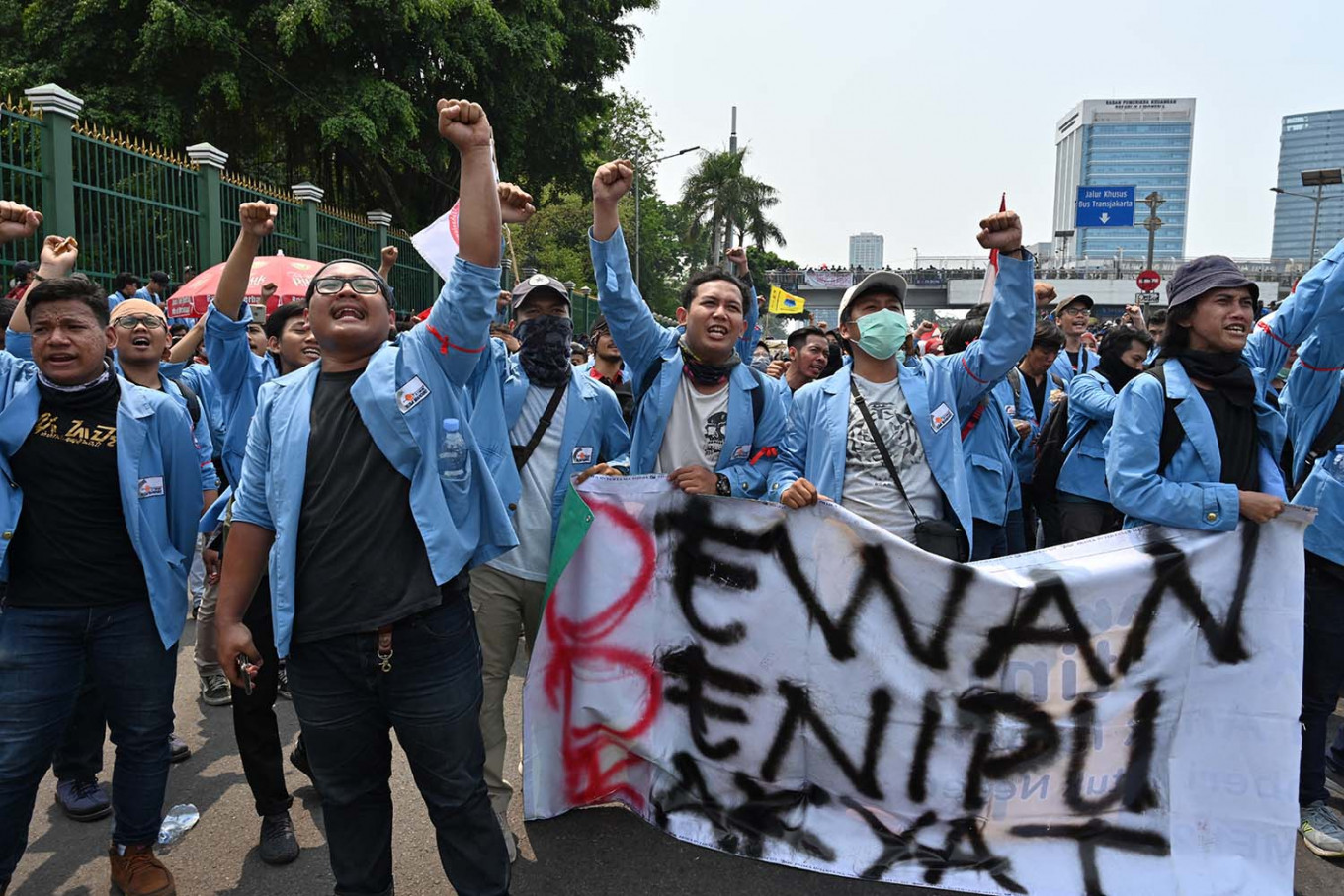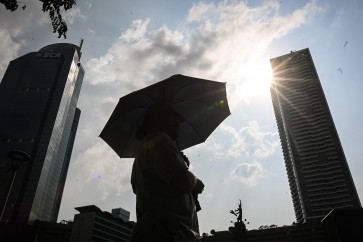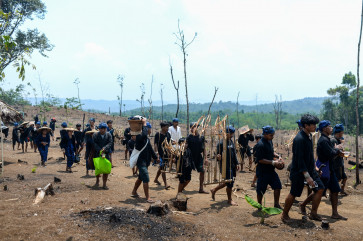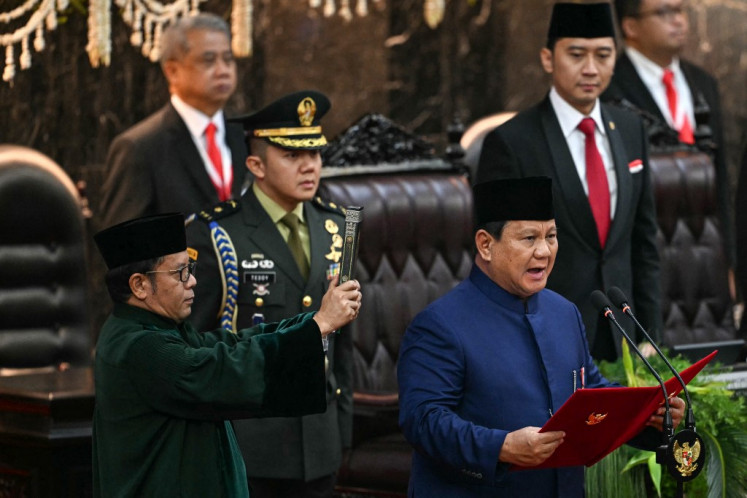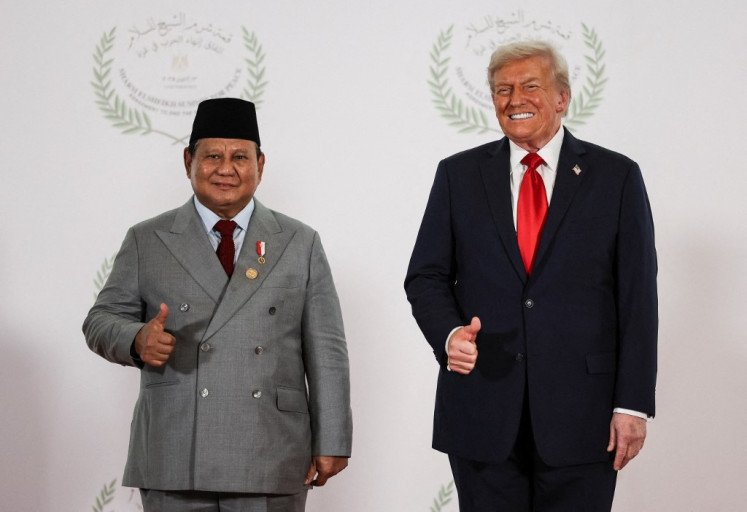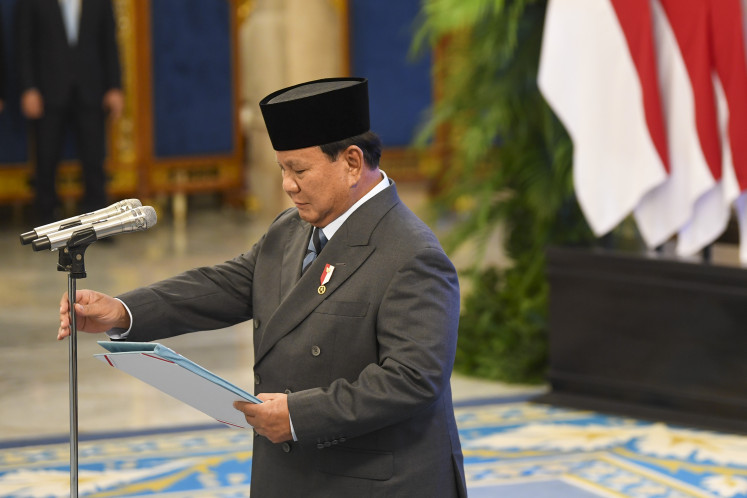Popular Reads
Top Results
Can't find what you're looking for?
View all search resultsPopular Reads
Top Results
Can't find what you're looking for?
View all search resultsIndonesia’s corruption perception rating deteriorates further
Indonesia, which was once considered the “big jumper” in corruption prevention in Southeast Asia, representing the “best practices” in combating graft, is currently experiencing significant regression
Change text size
Gift Premium Articles
to Anyone
T
he 2022 Corruption Perception Index (CPI), issued by Transparency International (TI) for 180 countries on Tuesday, showed stagnation in the rankings of several Southeast Asian countries and deepening democratic regression in some others that directly or indirectly impacted the quality of public-sector governance.
On a scale of one to 100, where one represents maximal corruption, Singapore’s CPI declined slightly from 85 in 2021 to 83 in 2022, followed by Malaysia from 48 to 47. Meanwhile, Vietnam improved from 39 to 42 and Thailand from 35 to 36. But Indonesia fell from 38 to 34, and the Philippines remained stagnant at 33. Laos went up from 30 to 31, Cambodia from 23 to 24, but Myanmar fell from 28 to 23.
These numbers show there was no big winner among Southeast Asian countries last year, although Vietnam deserves commendation for its increase of 3 on the index. Conversely, significant declines occurred in several countries, including Myanmar and Indonesia, which currently holds the ASEAN chairmanship.
In Myanmar’s case, corruption has undermined political, social and economic stability and has thereby threatened the state’s peace and security. Systematic and structured corruption has also created a fertile ground for the activities of organized crime, radicalism and terrorism, including sociopolitical disorder caused by political distrust. With the military firmly entrenched in power after its 2021 coup, Myanmar is unable to manage its anti-corruption measures and to reconsolidate its democratic pillars.
On the other hand, Indonesia, which was once considered the “big jumper” in corruption prevention in Southeast Asia, representing the “best practices” in combating graft, is currently experiencing significant regression.
Indonesia’s CPI 2022 saw the sharpest decline in its post-reform history. It was caused by decreases in constituent indexes, such as the Political Risk Service (PRS) International Country Risk Guide, IMD World Competitiveness Yearbook and PERC Asia Risk Guide, which assess political corruption, conflicts of interest, potential for abuse of power and bribery. Considering that most of the respondents in the survey were from the business community, this means that the freefall of the 2022 CPI shows the concern of business actors about the government’s commitment and political will to support democratic pillars and anti-corruption measures.
International agencies such as the World Bank and USAID have often reminded Indonesia of the need to improve policies on bureaucratic reform, deregulation and trade liberalization. In fact, many regulations are highly prone to conflicts of interests involving those in the President’s office and inner circle. They are politically capable of orchestrating various political forces and logistical sources to consolidate powers that support the presence of “populist authoritarianism”.
The ratification of the controversial Job Creation Law and the amendment of the Corruption Eradication Commission (KPK) law are two clear examples. The uncertainty about the constitutional status of the jobs law, which also stipulates controversial provisions on labor, the environment and trade, has adversely affected new investment. Corrupt forces have tried to maintain the status quo by extending the tenures of regional leaders and even village chiefs. This is a very serious issue as Indonesian politics today has been categorized by TI as between “Hybrid Regime” with a CPI average of 36 and “Moderate Autocracy” with a CPI average 30.
As the 2023 ASEAN leader, Indonesia must do something meaningful to increase Southeast Asian regional governance and deepen its strategic cooperation through an ASEAN Economic Community (AEC) to create a stronger economy to benefit the region’s total population of 650 million people. The single competitive market of ASEAN can only properly achieve its promises of regional prosperity and citizen welfare if the members collaborate to develop their economic capacities in a manner that also maximizes transparency and accountability.
Without better transparency and accountability, ASEAN is likely to facilitate only a limited number of existing business actors in widening their economic expansion in the region. As a result, there is a high risk that economic power will increasingly be concentrated in the hands of a few, with the potential to entrench high-level corruption rather than reduce it. The larger the capital flow, trade and economic transactions in the region, the more opportunities open for venal behaviors and reconsolidation of vested corrupt forces across the countries.
This potential is due to the ways that predatory corrupt forces across the region launder illegal funds, hide stolen assets and commit other illicit business and political acts from their own countries. ASEAN under Indonesia’s chairmanship urgently needs to address these risks.
***
Senior lecturer at the Paramadina University Graduate School of Diplomacy and managing director of the Paramadina Public Policy Institute. The views expressed in this article are personal.

